

Dr E Damigo
Dr. E. Damigos; PhD >> future thinker economist business management professor
Due Diligence Information Request Sample. Talent2 Market Pulse 1 Infographic APAC. O2HUB - Dr. Ev Damigo; PhD. Voodoo+1600x1200. BALLLL+-1920x1200. > Why We Ignore the Obvious ? AzureEye+XL. BOOST O2 >> Estée Lauder's William Lauder: 'The Consumer Still Wants and Needs to Be Touched' Knowledge@Wharton. FINANCIAL ECONOMIC POLITICAL. Andrew Lilico, writing in the gives us the answer to that question with a series of short bullet points.

O2 HUB. Warren Buffet on Squawk Box (all 12 videos) Buffett: Not Worried About Oil Warren Buffett, Berkshire Hathaway CEO, says he doesn’t worry about where oil prices are going.

Airtime: Wed. Mar. 2 2011 | 6:00 AM ET More videos after the jump Buffett Prefers Stocks – Not Bonds Warren Buffett, Berkshire Hathaway chairman & CEO, explains why steers away from fixed income investments. Home. Rediscovering the art of selling - McKinsey Quarterly - Retail & Consumer Goods - Strategy & Analysis. Retailers as far back as the legendary pioneer Marshall Field once focused intensely on clinching sales once customers walked into stores.
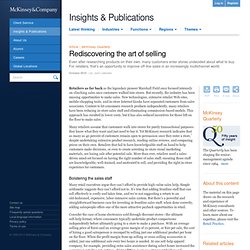
But recently, the industry has been missing opportunities to make sales. New technologies, extensive retailer Web sites, mobile-shopping tools, and in-store Internet kiosks have separated customers from sales associates. Content to let consumers research products independently, many retailers have been reducing in-store sales staff and eliminating commission-based models. Library - o2insidebusinessmanagement. IBM Selection - Actionable Insights. Green IT: IBM testing grounds. Making Green Work. Visit this groupWhen the economy turns rough, many companies sideline their green business initiatives. That's a big mistake. No company can afford to wait for the downturn to ease before going green. Green initiatives ratchet up your company's resource efficiency, creativity, and employee motivation. They save energy, waste, and money, preserving precious capital-and give precise focus to your innovation efforts and strategic priorities.
At a recent Harvard Business Review event, sponsored by the Hitachi, Andrew Winston outlined a road map for using green initiatives to deliver short-term gains and position your company for long-term strategic growth. Read the full report. Culture change. DR Damigos;PhD - DRibm - Driving Revenue Streams. When is this bubble in China going to burst? The ins and outs of Smart Pricing. The Ethics of Goldman SHARK. Dr Damigos; PhD - O2ibm - Boost your Business Oxygen. Tuning into their Brain - Employee behaviour for enhanced performance. What the Experts Say: New Hires Welcome Onboard.
What it takes for Group Dynamics to kill innovative drive. 8 Steps to summon the Leadership power to make the impossible happen. O2ibm Pearltrees >>> Thinking Ahead as a True Leader. Strategy Execution in times of Uncertainty. How do you Shield your Company in Times of Uncertainty? How to Create Uncontested Market Space and Make Competition Irrelevant. Learning to Lead. Herminia Ibarra , Professor of Organizational Behavior, and Faculty Director of the INSEAD Leadership Initiative, contests that we learn to lead in relationship, by becoming a part of a community and network of leaders, but what we preach, however, is very different.
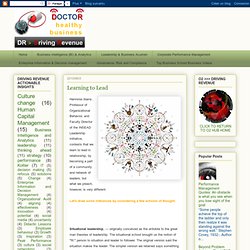
Let's draw some inferences by considering a few schools of thought: Why Consumer Goods Companies Need Analytics to Compete? Mark A.
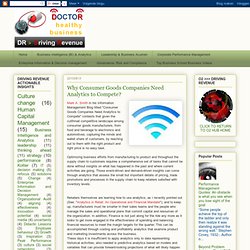
Smith in his Information Management Blog titled "Consumer Goods Companies Need Analytics to Compete" contests that given the cutthroat competitive landscape among consumer goods manufacturers, from food and beverage to electronics and automotives, capturing the minds and wallet share of customers, by reaching out to them with the right product and right price is no easy task. Optimizing business efforts from manufacturing to product and throughout the supply chain to customers requires a comprehensive set of tasks that cannot be done without insights on what has happened in the past and where current activities are going. Customer Loyalty: Is It an Attitude Or a Behavior? The people who've tried to define customer loyalty have usually approached it from one of two different directions - attitudinal and behavioral.
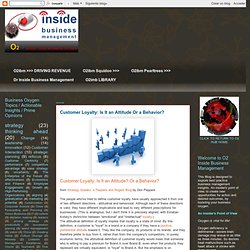
Although each of these directions is valid, they have different implications and lead to very different prescriptions for businesses. (This is analogous, but I don't think it is precisely aligned, with Estaban Kolsky's distinction between "emotional" and "intellectual" loyalty.) The attitudinal definition of loyalty implies that loyalty is a state of mind. By this definition, a customer is "loyal" to a brand or a company if they have a positive, preferential attitude toward it. The customer rarely buys what the company thinks it's selling him. Clayton Christensen classifies sustaining innovations as those that continue to improve a product or service, and move it up and up and up along the customer's need.
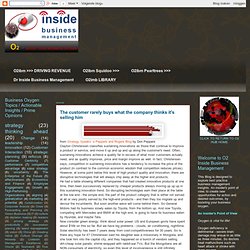
Often, sustaining innovations achieve a quality far in excess of what most customers actually need, and as quality improves, price and margin improve as well. In fact, Christensen says, competition in sustaining innovations has a tendency to increase the price of the product (in contrast to the common economic wisdom that competition reduces prices).
However, at some point below this level of high product quality and innovation, there are disruptive technologies that will always chip away at the higher end products. He had a table showing different companies that had created innovative products at one time, then been successively replaced by cheaper products always moving up up up in this sustaining innovation trend. Growth Market Strategy. How versatile is your pricing strategy? Walter L.
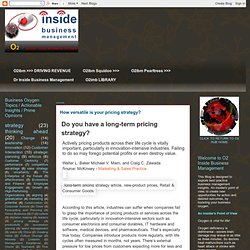
Baker Michael V. Change Comes in Waves. One of Saffo's most interesting perspectives is that innovation moves in phases.
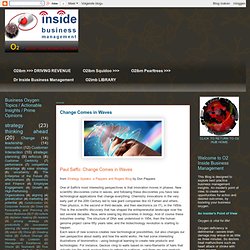
New scientific discoveries come in waves, and following these discoveries you have new technological applications that change everything. Chemistry innovations in the very early part of the 20th Century led to new giant companies like IG Farben and others.
Jazzy Business Management Insights. The Moment of Truth. Dr Damigo Knowledge Hub. What has changed in Management Consulting.docx. O2 Sources.